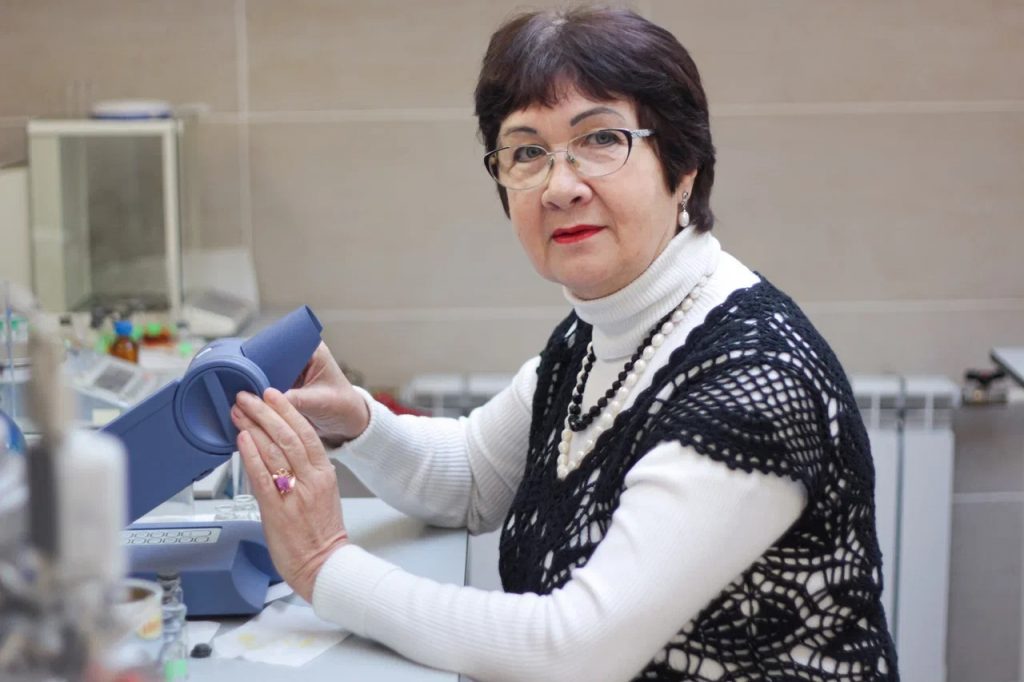Professor Irina Galkina speaks about her body of work in medical chemistry

Prior to Russian Science Day (February 8) and International Day of Women and Girls in Science (February 11), Dr Galkina gave an interview about her research.
During her career the Professor has so far synthesized over 150 drug candidates for veterinary and human medicine. Dr Galkina is a representative of a three-generation dynasty of KFU scientists.
“I have always been engaged in improving methods of directed organic synthesis within the framework of biomimetic approach, i.e. by imitating the structure or functions of more complex natural biological molecules in order to create artificial bio-similar molecule-models. An efficient method was developed for the synthesis of quaternary phosphonium salts with higher alkyl substituents – analogues of biomembrane fragments; metal complexes of carboxylated phosphabetaines – structural analogues of active centers of metal complexes; phosphorylated and aminated nitrogenous heterocycles – analogues of DNA and RNA,” she says.
The majority of such compounds have some type of antibiotic activity – antibacterial, antifungal, antiprotozoal, or antihelminthic.
“Based on the results of research, pharmaceutical compositions with low toxicity were developed and successfully passed laboratory and field tests: anti-inflammatory eye drops and ointments, a number of antihelminthic, antinematodic drugs, as well as anti-emeriosis, anti-pyroplasmidosis and anti-balantidiosis agents for the treatment of protozoal diseases. Ointments and suppositories for treatment of mastitis and endometritis of cows were developed, wound-healing powder and materials were obtained. All these developments are very dear to me. Leading scientists of KFU, Kazan State Medical University, Kazan National Research Technological University, Kazan State Medical Academy, and Kazan State Academy of Veterinary Medicine took part in their improvement, as well as in the manufacture of dosage forms of preparations and their testing on animals. We have jointly obtained more than 50 patents,” continues the interviewee.
Before his passing, Dr Galkina’s spouse Vladimir Galkin (1954 – 2020), Director of KFU’s Institute of Chemistry in 2003 – 2020, also partook in medication studies.
“Vladimir was a well-known expert in the field of quantitative organic and organoelement chemistry, reactivity and reaction mechanisms. He created a new model of the steric effect in analyzing the reactivity of organic compounds, developed approaches to the evaluation of spatial interactions, and obtained, very importantly, quantitative data for analyzing the reactivity of various classes of compounds. In 1991 he defended his second doctoral thesis. The model he developed was internationally recognized. Together with German and American scientists, a large monograph in English on this topic was published,” informs Professor Galkina. “After defending his doctoral thesis, Vladimir joined my line of research – directed synthesis of physiologically active substances in the range of functionalized quaternary phosphonium salts and their metal complexes. Together with scientists of the largest universities of the Republic we developed and patented medicines for veterinary medicine, for domestic and farm animals. Smart molecules were synthesized by chemists, their properties were studied by chemists, biologists and physicians, drug formulations were created by pharmacists, and veterinarians tested them on animals. It is important that our close-knit group of like-minded scientists is about twenty years old. In 2015, we were awarded the State Award of the Republic of Tatarstan for a cycle of scientific research and inventions.”
The lineage of chemists is continued by Yuliya Bakhtiyarova (Galkina’s daughter) and Dmitry Bakhtiyarov (her grandson), who are both employed by KFU as well.
Yuliya Bakhtiyarova followed Vladimir Galkin in becoming Chair of the Department of High Molecular and Organoelement Chemistry. She is currently working on her second doctoral (DSc) thesis.
Dmitry Bakhtiyarov, in his turn, plans to dedicate his Candidate of Science (PhD) thesis to the synthesis of sulphur-containing and phosphorus-containing onium salts.

